Desert of Souls: A Review
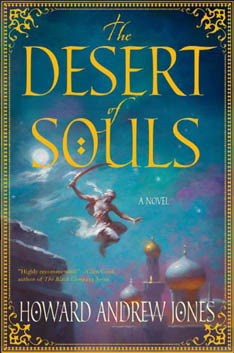 Desert of Souls, by Howard Andrew Jones.
Desert of Souls, by Howard Andrew Jones.
Thomas Dunne Books (320 pages, $24.99, February 15, 2011)
As I write this, I’m listening to Silk Road Journeys: Beyond the Horizon, because sometimes Yo-Yo Ma’s cello just does things to a girl, you know? Anyway, it seems appropriate, so I thought I’d share.
First of all: Spoiler Alert. Probably minor ones, but you never can tell with me, so if you don’t want to know a few plot points, some specifics of the characters, interesting quotes and structural ramblings, please do not read further.
Second of all: I met the author once four years ago and have corresponded with him a few times, so there’s that. I am not an unbiased reader. But this is a blogicle for Black Gate Magazine, after all, and as we’re having a month-long celebration of Howard Andrew Jones over here, I don’t really think anyone expects me to be neutral!
…Hurray!
Third of all: I confess that I’d never read a Dabir and Asim story – in Black Gate or elsewhere – before this debut novel, so I came to it with no thought more profound than, “What pretty colors the cover has!” and “ Oh, great, now I want a scimitar too!”
I read Howard Andrew Jones’ Desert of Souls a few weeks ago, in snippets at first (train times, lunch times, right before bed) and then it got to that point good books get to, when, if you’re not allowed to read the rest in one big chunk, you are likely to stalk into the kitchen and start breaking things.
“I just want –“
SMASH!
“To finish –“
CRASH!
“My frickin –“
KERPLOOEY!
“BOOK!”
Don’t you get it, People Who Disrupt Claire’s Reading Time? I’m at that part of Desert of Souls with the (choose one) ghost city/foreboding fortune teller/kidnapping, and they’re right in the middle of an epic swordfight with a (choose one) sorcerer/ginormous serpent/corpse-bird, and the cool girl character Sabirah just showed up again, and no, I’m not interested in eating anything but this hardcover, THANK you!
But enough about me. Let’s talk about Desert of Souls.
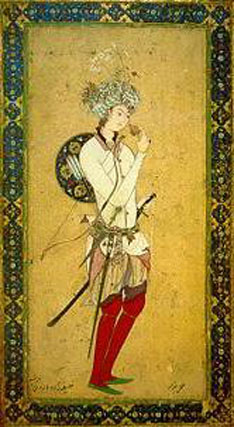
The book launches us straightway into eighth-century Baghdad, city of history and myth, the Baghdad of the Golden Age under the Abbasid Caliphate and the rule of Harun al-Rashid.
In the first chapter, we find ourselves in the vizier’s palace, with a dead parrot and a first person protagonist we wouldn’t mind having at our back in a battle. I mean — you know you’re with a real warrior when he announces things like:
“There are those who say combat is a whirlwind that leaves no time for thought. I find that the world seems slowed at such moments… that my soul sings with life.”
The second chapter begins with a sword fight, the third with a shifty Archduke and his deputation, and the fourth with a demon monkey.
That’s right. Those’re the first four chapters! And you know what? This book keeps clipping along! Not only is there never a dull moment, but the more you read, the more you care about the characters, the higher the stakes, the graver the consequences. It all happens just like it’s supposed to. A danged good structure. Nothing wasted.
Now, I’m not going to write a whole synopsis. I’ll leave that to professionals, like David Pitt from Booklist. Here’s what he said on Amazon.com:
“A mysterious object comes into the possession of the royal Jaffar. He instructs Asim, captain of the royal guard, and Dabir, a scholar, to solve the mystery of the object’s inscription. The object is stolen, but not before Asim and Dabir have uncovered tantalizing clues to its history: it appears that it may have come from Ubar, a lost city that was, or so the legend goes, destroyed by God. But can Asim and Dabir uncover the secrets of the lost city before their own lives are lost, too?”
There. That’s out of the way. Plot, plot, plot. It’s interesting, sure, but what I really like is CHARACTER! So let’s talk about our narrator, Asim.
He is captain of the vizier’s guard. He is “broad-shouldered and tall, and clear-eyed.” He is used to girls making sheep’s eyes at him. He likes to eat sweet things. He is a devout Muslim and a really bad liar. A man of his times, he’s got a strong racist chip on his shoulder against Greeks and “Marsh Arabs” and probably anyone who wasn’t born and raised in Baghdad. He’s suspicious of Magians (“They are not People of the Book,” he tells Dabir, who replies shortly, “Wisdom is wisdom,” in a nice example of the sort of tag-team those two make), and is by turns intolerant of, clueless about, or generally oblivious to, women – even though he’s been married twice: once widowed, once divorced.
In short, our man Asim’s a well-rounded individual — totally, exasperatingly, wonderfully flawed, with (which feels unusual for some reason; I’ll have to start paying better attention to other fantasy books) both a history and a future shimmering just over his very-present text. There is a sense of the places Asim has been and of those he’ll take you to yet – maybe not in this book, but later. How glad I am there is a sequel coming, and that there are short stories to ferret out and slurp up!
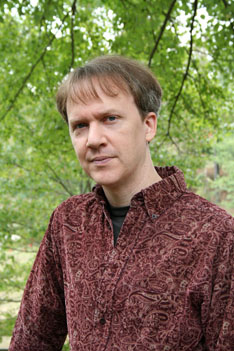
While Asim is a man of his times, Mr. Jones is an author of his, and it is very clear to me, that while we experience the world of Desert of Souls through Asim’s rather narrow view, the author is also aware of the narrowness. Is, in fact, aware that his narrator is a bit of lunkhead.
The endearing thing about Asim is – well, there’s room enough in that big ol’ hard head of his to grow. Especially once he gets Dabir for a best friend and fighting partner in a life that is hopefully full of magic and monster-pwning. Which brings us to Dabir.
Sigh. Dabir. (You can’t see me right now, reader, but I’ve been saving my own sheep’s eyes for this moment.)
Dabir is a scholar, a speaker of languages, a translator of ancient texts. At the start of the book, Asim is friendly enough with Dabir – had worked alongside him in the vizier’s household for a few years, has a hefty respect for him, but doesn’t yet have that BFF brothers-til-death-and-beyond connection that one is led to expect in a novel described as “the genesis story of Dabir and Asim.” We keep waiting for it to happen. And sure enough, little by little, trial and tribulation draw those two unlikely friends together.
When I started this book, I knew it was a “Dabir and Asim” story, just from the way it’s talked about. Check it — Dabir’s name comes first in that dynamic duo – and he’s not even the protagonist! Just for this, when he first comes onto the scene in Desert of Souls, he totally had my attention. After that, he earned and kept it, from the way he talked about coins to the fact that, despite being an honorable gent in most other ways, he’d still lie, steal and maybe even kill for a chance to study a particular antiquity – any antiquity, really.
Hot. I don’t blame Sabirah for wanting to sit at his feet and learn ALL SORTS OF THINGS from him.
Which brings us to Sabirah, the vizier’s niece.
Love! Her!
First, I’m gonna have a feminist moment. Just a little one, I promise. Now, I love fantasy. (I mean, I’m here, aren’t I?) Over the years, it has come to my attention that many a fantasy book consists of a cast of thousands – sprawling, Dickensian, mutli-racial Dramatis Personae – warriors and mages, thieves and kings, orcs, werewolves, etc! And in those casts of thousands, MAGICALLY, there exist maybe three females, five at best, and only one of any real significance, this being the “love interest.”
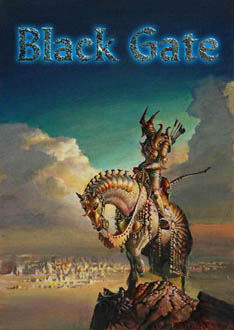
Of course I exaggerate slightly, because I take pleasure in hyperbole, but not as slightly as you might think. Females are something I count in fantasy books. It’s not too hard. Usually I don’t even have to use my toes!
Sabirah is one of four female “stand-out” characters in Desert of Souls, the others being a fortune-teller, a villainess named Lydia (embedded in a story within a story), and a woman of high rank whom we never see, but whose behind-the-screen presence secures the fate of one of the main characters.
Believe me, Sabirah stands out. If you have to have only one lady of any real importance, she’d best be smart, doughty, passionate, articulate and active. Sabirah is all of these things. When she disappears from the narrative at the end, it leaves an ache like that which echoes back to us from human history. Where did she go? What will she do now? Will she be in the next book?
We have only Asim to tell us, and he doesn’t really know. He’s very busy at that point. He’s got prisoners to rescue and towers to topple and is up to all sorts of shenanigans. What’s one girl’s fate to him?
Upon reflection, I realized that if Howard Andrew Jones had written Desert of Souls any other way, it would not have been so believable. Just because I want both fantasy and history to be fully as populated by women as men, rife with their own adventures, magic, mystery and sword-fights, that doesn’t mean that it is appropriate for every book to contain such matter.
Because, you see, Desert of Souls is Asim’s story. And Asim is, as I’ve pointed out, a man of his times. Brave and brawny and beautiful, honorable, devout, deep-feeling – aaaaand a lunkhead. He may think Sabirah is impetuous and naïve and “no brighter than any other girl,” but it’s fairly obvious – from the actual text and from reading between it – that she’s smarter than he is. “She chirps after knowledge as a newborn sparrow for worms,” as Dabir says. One loves her – one hurts for her – and when she departs from the pages, one wants more of her.
And this hungry feeling? Is no bad thing for a reader to have. It means the author is doing his job — and leading us by a trail of breadcrumbs toward the second novel!
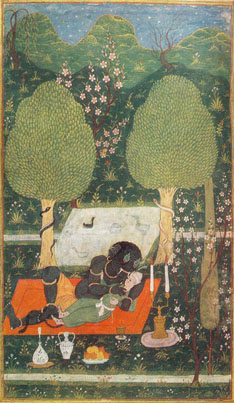
When wisdom does come to Asim, it has to get knocked in. Repeatedly. But once in – and I’ll give this to him – it stays. He learns his lessons. The Asim at the end of Desert of Souls is not the same Asim as at the beginning. Throughout this swiftly-paced novel, with its incredible fight scenes and glamorous magic, its fabled cities “destroyed by Allah in a rain of fire and covered over with a sea of sand” and its ancient monsters, there is another journey, subtler and more delicately drawn, of the narrator’s inner character. Asim changes – grows up, you might say, though he starts the book out a man in his prime – as he is exposed to life outside the palace, with folks he would not normally mingle with, and alongside wry, wise, worldly Dabir, who is the best thing that ever happened to him.
The great thing about a first person point of view (other than the fun we have with unreliability of the teller), is that, while we know the narrator survives to tell the tale, we don’t know how exactly. It’s the how that’s interesting. We don’t know if Asim ends up one-eyed, a eunuch, a king or a god. We don’t know who he’ll lose along the way or what he’ll learn. In fact, as Desert of Souls is a fantasy novel, we can’t even be absolutely sure Asim is alive; he might be scribbling down his memoirs in the Hall of Angels, writing in letters of fiery coal upon sheets of polished porphyry!
What we are promised is that Asim and Dabir go on kicking monster butt and taking djinn names well into their middle age – and hopefully even into the kind of retirement a swell pair of heroes can’t seem to keep retired!
After reading Desert of Souls, I know I’ll follow them there. Come with me. It’s gonna be a splendid ride.
SWEET, sweet review Claire!
Howard, this is the review you should parade, post on billboards, drag behind bi-planes, sell on surfboards, engrave in the side of a mountain!
Compelling, divine, enthralling, eloquent beyond compare. I am happily jealous of these fine, fine words. 🙂
Well, THANKS, Jason! I needed to write a review that upheld the absolute coolness of the book. 🙂 backatcha.
If I had a bi-plane, I’d drag this review behind it.
Right after I shot down Baron von Gelder’s zeppelin, of course.
I do not think they sell bi-planes on e-bay.
Can you make bi-planes out of superglue and shrink-wrapped RPGs? Because you have LOTS of those.
…Maybe a glider. A glider and a squirt gun. Can you shoot down the baron’s zeppelin with a squirt gun? IF YOU SQUIRT ACID?
You can use this review for your parachute.
OK, well I checked and Amazon.com says I can get this book to a Kindle. Since I have a Pan Digital reader, I am not sure what will happend, but will give it a try! Great review, C. S. E.! makes me want to read it!
Thanks for reading, Sita! BUY THIS BOOOOOK!